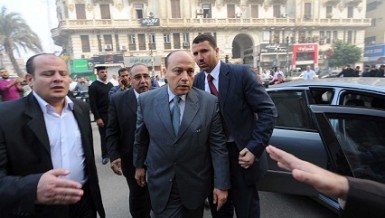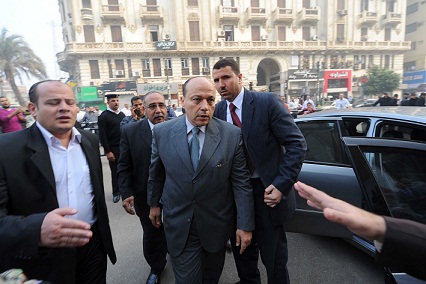
(DNE / Ahmed Al-Malky)
A group of political activists summoned by Prosecutor General Tala’at Abdallah for allegedly inciting violence criticised the decision and announced they will not attend their interrogation.
The prosecution on Monday issued arrest warrants for five activists as well as summoning a sixth for questioning over accusations of inciting violence against Muslim Brotherhood members prior to the Friday clashes in front the Brotherhood’s Moqattam headquarters.
Political activists Hazem Abdel Azim and Ahmed Eid announced in a press conference held on Wednesday by 20 opposition movements that they will not be prosecuted by an “illegitimate” prosecutor general.
Eid stated he refused to be prosecuted by Abdallah whose appointment triggered nationwide strife. He added that the arrest warrants issued by the prosecutor general are an attempt to taint the activists.
“My arrest warrant is has to do with accusations that the Al-Dostour Party detained 15 Muslim Brotherhood members in the party’s headquarters in Moqattam,” said Eid, a member of the Al-Dostour. Eid stated that during Friday’s clashes, the headquarters was turned into a makeshift hospital to assist the injured. “How can a makeshift hospital full of journalists be a place for detaining anybody?”
Abdel Azim stated that the arrest warrants are part of the regime’s systematic plan to quell the opposition. “It’s nothing new,” he said. “All fascist regimes take the same path.” He added the Brotherhood faces peaceful protesting with forceful dispersion.
Shady Al-Ghazaly Harb, an Al-Dostour Party member who moderated the press conference, said that what’s happening is a fierce attack on revolutionary youth. “They’re trying to copy the scenario of the Iranian revolution,” he said, adding that such actions will not make the revolutionaries stop.
An Al-Dostour Party leader, George Ishaq, stated that the opposition movements thrive for a state governed by the law. “Yet, a just state is also what we’re after,” Ishaq said.
Ishaq announced that opposition movements will head to the prosecutor general’s office on Friday to stage demonstrations.
“I want to ask this private public prosecutor,” Ishaq said, referring to Abdallah, “what has he done in regards to those who besieged the Egyptian Media Production City (EMPC) and attacked the media professionals working there?”
Members of Islamist movements camped outside the EMPC on Sunday in protest over what they described as the media’s misleading coverage of Friday’s clashes.
Commenting on the prosecutor general, novelist Alaa Al-Aswany said that the Cairo Court of Appeal’s verdict overturning Morsy’s decision to dismiss former prosecutor general Abdel Meguid Mahmoud proves the opposition’s words. The Court released its verdict on Wednesday.
“This shows that Abdallah is indeed not a legitimate prosecutor general,” Al-Aswany said. “It proves our objections weren’t empty talk.”
He accused the Muslim Brotherhood of using the prosecutor general to make political gains. “The winds of justice blow in the Brotherhood’s direction,” Al-Aswany said.
Nasser Abdel Hamid, an Al-Dostour Party member, said: “We don’t want either Abdallah or Abdel Meguid. We want an independent prosecutor general.”
Among the other political activists referred to investigation by the prosecutor general are Alaa Abdel Fatah and Nawara Negm. Abdel Fatah showed up at the High Court building on Tuesday amid chants and cheers by protesters gathered in solidarity with the summoned activists. He claimed to have refused to answer the prosecutor’s questions while the prosecution spokesperson released a statement alleging that Abdel Fatah had denied ownership of the Facebook and Twitter accounts he was being questioned over.

